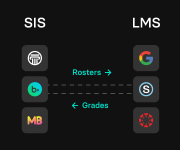|
|
 
|
Top Story
| |
 |
| (Fine Art/Getty Images) |
Researchers have discovered that multiple infectious diseases, including previously undetected bacteria such as Borrelia recurrentis and Salmonella enterica, contributed to the decimation of Napoleon Bonaparte's army in the 1812 invasion of Russia. The study, published in Current Biology, has analyzed DNA from the teeth of soldiers who were buried in a mass grave in Vilnius, Lithuania. |
|
|
 | Stop Double Entry Between Your SIS and LMS
Flow automatically syncs classes, rosters, assignments, and grades between your Student Information System and Learning Management System. No more manual updates or duplicate work. Learn more about Flow. |
|---|
| |
|
|
 
|
Science in the News
Paleontologists have rebuilt the profiles of two specimens of the duck-billed dinosaur species Edmontosaurus annectens, using remains preserved through a rare mummification process involving a thin clay layer. The findings, published in Science, reveal a flat-bottomed, wedge-shaped hoof similar to that of a horse on the larger mummy's hind feet, as well as scaly skin and a fleshy crest that leads to spikes on its back. |
|
A precise system of overlapping tables in the Mayan lunar calendar is responsible for the ancient civilization's remarkable accuracy in predicting solar eclipses for more than 700 years, researchers write in Science Advances. By resetting the tables at calculated intervals, the Mayans corrected accumulating errors in the Dresden Codex, a manuscript that contains a 405-lunar-month eclipse table that originated as a lunar calendar aligning with the Mayan 260-day astrological calendar, according to the paper. |
|
An engineered strain of Metarhizium fungus attracts mosquitoes by mimicking the scent of flowers they use for nectar, then kills 90% to 100% of mosquitoes in days. The fungus releases the compound longifolene, which is safe for humans and could save lives in regions where dengue and malaria are widespread, say researchers, whose work is published in Nature Microbiology.
| Full Story: Earth (10/25) |
|
|
|
Using fitness apps can cause feelings of shame, frustration and disappointment when goals set by the apps are not achieved, demotivating users, researchers reported in the British Journal of Health Psychology. Researchers analyzed nearly 14,000 social media posts about five popular fitness apps and found evidence of shame, irritation, annoyance and skepticism. The researchers suggested that fitness apps take a more holistic approach and focus on overall well-being. |
|
| |
 |
| (Huizeng Hu/Getty Images) |
People exposed to sugar rationing in utero and during their first two years of life had lower risks of cardiovascular disease and related conditions after age 40, according to an analysis of data from the World War 2 era when sugar rationing was common. The study, published in The BMJ, compared people who experienced sugar rationing with those who had not and suggested diabetes and hypertension may account for 31% of the link between sugar rationing and cardiovascular disease, with birth weight linked to 2.2%. |
|
A study in the European Journal of Pediatrics associated the use of surfactant with improvements in aeration in the right lung more than the left lung in extremely preterm infants with respiratory distress syndrome. "We hypothesize that surfactant probably reaches the right side more easily and the basal regions of the lung to a greater extent than the apical ones, leading to focal heterogeneous air distribution that might reflect a combination of both over-expanded and collapsed alveoli, observations that warrant continued future studies," researchers wrote. |
|
|
 | The Future of Retail: What's Coming in 2026
AI personalization and seamless customer experiences defined 2025, but the retail landscape is about to shift again. Join us on November 5th for a fast-paced webinar where industry experts reveal the top trends and technologies shaping 2026. Discover how to stay ahead, boost productivity, and deliver next-level shopping experiences. Register now! |
|---|
| |
|
|
 
|
Funding Watch
|
Rutgers University researchers, in collaboration with Emory University, will examine the effects of wildfire smoke on fertility and reproductive health, with a $4 million grant from the National Institute of Environmental Health Sciences. The study will integrate epidemiology, exposure science and laboratory toxicology to explore how ultrafine particles and toxic gases in wildfire smoke influence reproductive outcomes.
|
|
|
 | Eliminate Operational Blind Spots
Gain clarity and control over your IT services operations. Our guide offers practical steps to eliminate inefficiencies and create predictable profitability through unified visibility and smarter decision-making. Download the Guide » |
|---|
| |
|
|
 
 
|
Sigma Xi News
|
The International Forum on Research Excellence (IFoRE) is going virtual for 2025. Same cutting-edge research, student awards, innovative talks and mentoring from thought leaders across the global research enterprise -- accessible for every budget and location.
|
|
|
| | |
